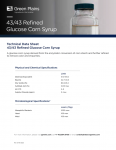Chinese MSG exporters to EU to pay stiff anti-dumping tariffs
40 per cent on monosodium glutamate (MSG) imported to the EU from
China, following an investigation into the effects of lower-priced
imports on EU industry.
MSG is an additive that is mainly used as a flavour enhancer for foods such as soups, fish and meat dishes, and ready meals. It is also used in the personal care industries. The investigation by the European Commission was launched last September, following a complaint by Ajinomoto Europe, the only MSG producer in the EU. It complained that it had suffered material injury as a result of dumping of material on the EU market by Chinese firms, and provided evidence to investigators to support the dumping allegation. Following findings that supported Ajinomoto's claims, the EC is imposing a provisional duty rate of 39.7 per cent on the bulk of Chinese MSG producers exporting to the EU. Lower rates were granted to companies that provided full information on their MSG activities in Europe to help with the investigation. Ajinomoto had not responded to a request for comment on the decision, which was published in the Official Journal of the European Union on Tuesday, prior to publication of this article. It is likely to be well received, however, as a major step towards re-establish a balance in the European market. The proposed injury elimination margin is 63.7 per cent. European manufacturers that use MSG in their products include Nestle and Unilever. A third user was mentioned in the journal report, but the Commission upheld its request not to be named on the grounds that this would have an adverse effect on the company. The period under the investigators' spotlight ran from 1 July 2006 to 30 June 2007. Although there are believed to be many Chinese exporting producers, the Commission received responses from only three groups about their activities: Meihua Group; LingHua Group; and Fujan Province Jianyang Wuyi MSG Co. Information from one of the exporting producers was reckoned in on-the-spot checks to be falsified, however, and was discarded. The journal did not specifically identify which of the three groups this was. Only companies in the Meihua Group and the Fujan Province Jianyang Wuyi MSG Co received preferential anti-dumping tariff rates, of 33.8 per cent and 36.5 per cent respectively. During the investigation period, 34613 tonnes of MSG were imported to the EU from China, according to Eurostat. The price per tonne fluctuated, with a slight decrease of two per cent, but it worked out to be an average of €773 per tonne. This was found to undercut Ajinomoto's price by between 21 and 24 per cent. The investigation concluded that Ajinomoto had suffered injury as a result of this. Production and capacity utilisation fell by 6 per cent and 14 per cent respectively. While use of MSG in the EU fell by 4 per cent during the investigation period, Ajinomoto's sales volumes fell by 24 per cent, which led to a 12.5 per cent loss in market share. In fact, the investigators said that this drop in sales volumes was a consequence of a 19 per cent increase in the selling price of European-produced MSG, due to cost increases. "Hence, the other financial injury indicators, including return on investments, cash flow and profitability also developed negatively during the period considered." Between 2004 and 2007 Ajinomoto actually invested in increasingly capacity for MSG, improve efficiency and developing new products, following its acquisition of Orsan. Until 2003 Orsan was in a poor financial position, but it brought to Ajinomoto better strains for using the in MSG-producing fermentation process. The investigators also said that other injury indicators like stocks and employment developed negatively. None of the three Chinese groups that aided in the investigation have not commented publicly on the imposition of duties. However all interested parties will be invited to make their views known on the investigation and its results, which will then be considered before any definitive measures are put in place.













